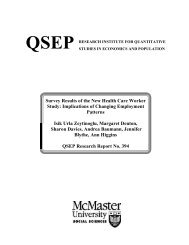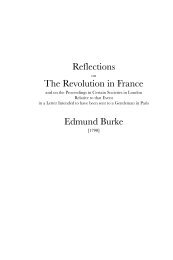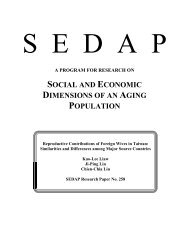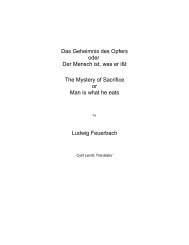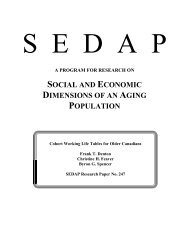Two Treatises Government John Locke - Faculty of Social Sciences ...
Two Treatises Government John Locke - Faculty of Social Sciences ...
Two Treatises Government John Locke - Faculty of Social Sciences ...
Create successful ePaper yourself
Turn your PDF publications into a flip-book with our unique Google optimized e-Paper software.
44/<strong>John</strong> <strong>Locke</strong>same power he hath, and by the same title: and therefore he cannotforbear saying himself that “he cannot see how any man’s children canbe free from subjection to their parents,” p. 12, which, in common speech,I think, signifies mother as well as father, or if parents here signifiesonly father, it is the first time I ever yet knew it to do so, and by such anuse <strong>of</strong> words one may say any thing.§64. By our author’s doctrine, the father having absolute jurisdictionover his children, has also the same over their issue; and the consequenceis good, were it true that the father had such a power: and yet Iask our author whether the grandfather, by his sovereignty, could dischargethe grandchild from paying to his father the honour due to himby the fifth commandment. If the grandfather hath, by “right <strong>of</strong> fatherhood,”sole sovereign power in him, and that obedience which is due tothe supreme magistrate he commanded in these words, “Honour thyfather,” it is certain the grandfather might dispense with the grandson’shonouring his father, which since it is evident in common sense he cannot,it follows from hence, that “honour thy father and mother” cannotmean an absolute subjection to a sovereign power, but something else.belie right therefore which parents have by nature, and which is confirmedto them by the fifth commandment, cannot be that political dominionwhich our author would derive from it: for that being in everycivil society supreme somewhere, can discharge any subject from anypolitical obedience to any one <strong>of</strong> his fellow-subjects. But what law <strong>of</strong>the magistrate can give a child liberty not to “honour his father andmother?” It is an eternal law, annexed purely to the relation <strong>of</strong> parentsand children, and so contains nothing <strong>of</strong> the magistrate’s power in it, noris subjected to it.§65. Our author says, “God hath given to a father a right or libertyto alien his power over his children to any other,” O. 155. I doubt whetherhe can alien wholly the right <strong>of</strong> honour that is due from them; but be thatas it will, this I am sure, he cannot alien and retain the same power. Iftherefore the magistrate’s sovereignty be, as our author would have it,“nothing but the authority <strong>of</strong> a supreme father,” p. 23, it is unavoidable,that if the magistrate hath all this paternal right, as he must have iffatherhood be the fountain <strong>of</strong> all authority; then the subjects, thoughfathers, can have no power over their children, no right to honour fromthem: for it cannot be all in another’s hands, and a part remain with theparents. So that, according to our author’s own doctrine, “Honour thyfather and mother” cannot possibly be understood <strong>of</strong> political subjec-




